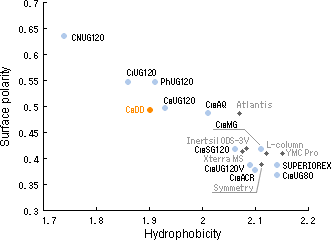
|
|
DD stands for Double Durability. In general, the durability of stationary phase decreases as its alkyl group length becomes short. Osaka Soda developed a C8 phase featuring both acidic resistance and basic resistance by applying a special
polymer coating technology.
|
|
|
|
 |
|
Exceptional acidic and basic resistance
|
C
8 phases have been considered useful in analyzing substances quickly. However, having a shorter alkyl chains than C
18 ones, they used to show a limited durability. Hydrophobic alkyl groups play important roles not only in chromatographic separation but also in the protection silica surface and binding structure against various chemical
attacks by mobile phases. Osaka Soda found a way to establish a chemically stable C
8 phase by applying the unique polymer coating technology.
|
|
|
 |
|
Features
|
|
|
· Excellent durability
|
|
→
|
Excellent acidic resistance
A life time of a column under acidic conditions largely depends on the content of organic solvent in the mobile phase. The durability test used here was under pH1 and no organic solvent, which
is considered extremely tough.
|
|
|
→
|
Excellent basic resistance
All the C18 phases use silica as a chromatographic support. Silica is known to dissolve in neutral to basic conditions. The durability test was designed to be tough, being carried out
under pH 10, a highly basic condition.
|
|
|
|
|
|
|
· Low pressure
|
|
→
|
The column pressure was compared in a mobile phase of 50% methanol. Since the 50% methanol maximizes the viscosity, the column pressure also becomes the highest.
|
|
|
|
|
|
|
· Excellent peak shapes of basic compounds
|
|
→
|
The CAPCELL PAK Series provides columns made of silica coated with silicone polymer that are not affected by residual silanol groups or metallic impurities. Therefore, extremely symmetrical peak shapes free of tailing are achieved
even from a pyridine, a basic compound used for evaluating interaction with residual silanol groups.
|
|
|
|
|
|
|
· Optimum for quick analysis of various hydrophobic mixtures
|
|
|
· Rapid, sharp elution of very hydrophobic compounds, yet keeping retention of polar compounds
|
|
|
|
|
|
· Also available worldwide
|
|
|
 |
|
Property values
|
|
|
Pore size
(nm)
|
Particle size
(µm)
|
Specific surface area
(m
2/g)
|
C%
|
Density
(µmol/m
2)
|
Functional group
|
Acceptable pH
|
USP
|
|
|
8
|
3
|
300
|
11
|
3.8
|
Octyl group
|
1.5~10
|
L7
|
|
|
8
|
5
|
300
|
11
|
3.8
|
Octyl group
|
1.5~10
|
L7
|


